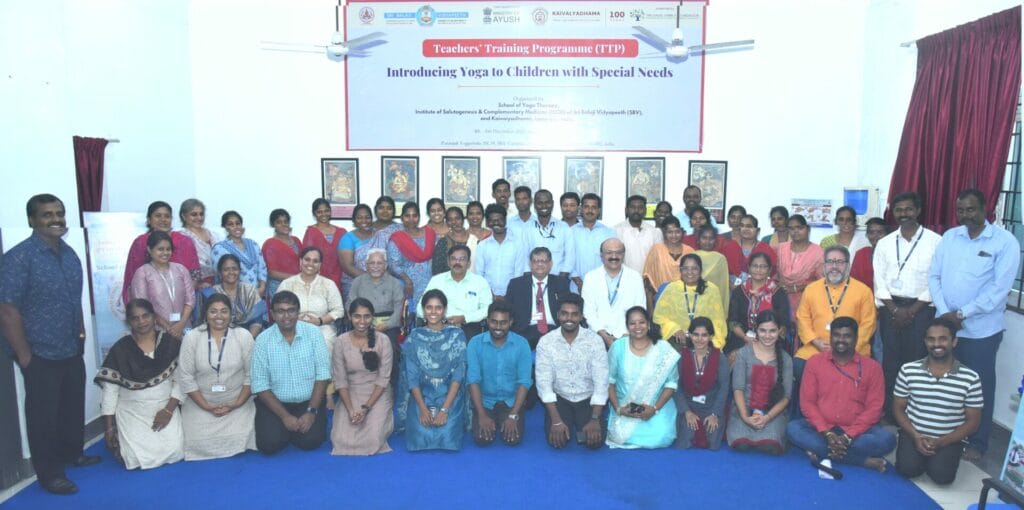The Institute of Salutogenesis and Complementary Medicine (ISCM) of Sri Balaji Vidyapeeth (SBV) recently hosted a Teacher’s Training Programme (TTP) on ‘introducing yoga to children with special needs.’
The three-day programme was organised in collaboration with Kaivalyadhama Yoga Institute, Lonavala, the Ministry of AYUSH, and the Dalal Family Foundation, US.

Nihar Ranjan Biswas, SBV Vice-Chancellor, inaugurated the event in the presence of Sridharan Rajappa, Director of Indian Systems of Medicine and Homoeopathy, government of Puducherry.
The chief facilitators of the free-of-cost TTP included Meena Ramanathan, Vice Principal of the School of Yoga Therapy, SBV, and Praseeda Menon, Assistant Professor and Research Officer, Kaivalyadhama.
On the occasion, Sugathan M., consultant clinical psychologist and founder of SADAY School; Chitra Shah, Director, Satya Special School; and Sri Saravanan Palani, State Coordinator, Samagra Shiksha, Directorate of School Education, were honoured for their pioneering work on children with special needs.
Subodh Tiwari, CEO, Kaivalyadhama Yoga Institute, and Secretary General of Indian Yoga Association; A.R. Srinivasan, Registrar, SBV; and Ananda Balayogi Bhavanani, Director, ISCM, SBV, offered felicitations.
According to ISCM, yoga-based interventions hold immense potential to enhance the quality of life and overall well-being of children with NDDs by promoting relaxation, coordination, focus, and reducing stress and anxiety.
Neurodevelopmental disorders (NDDs), commonly known as special needs, encompass a range of disabilities that primarily affect the brain’s functioning during a child’s developmental years. These disorders can manifest as difficulties in language and speech, motor skills, behaviour, memory, learning, and other neurological functions.
Estimates that nearly one in every eight children in India may be grappling with at least one NDD, highlight the prevalence of these conditions in children aged two to nine years at nearly 12%.
The programme was held as part of Kaivalyadhama undertaking a series of TTPs based on the recognition of yoga’s transformative impact on the holistic well-being of children with NDDs.
The TTPs aim to equip special educators, physical education teachers, and other caregivers and educators working with children with specific NDDs with the necessary knowledge and skills to introduce yoga into their lives.
Participants will be trained to conduct engaging and enjoyable yoga sessions tailored to the needs of children with specific NDDs. Additionally, participants will have the opportunity to contribute to related yoga research by employing observational tools and questionnaires to collect valuable research data.

